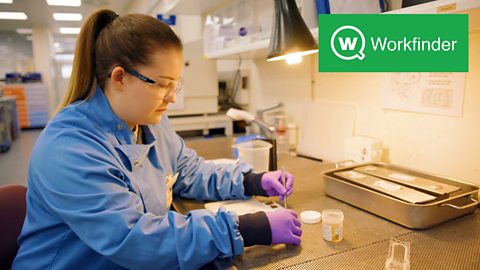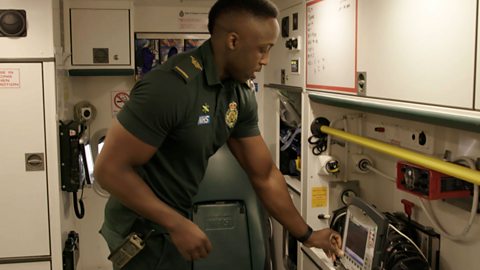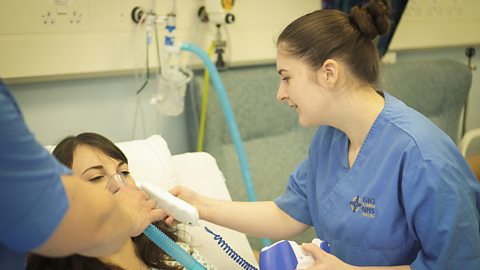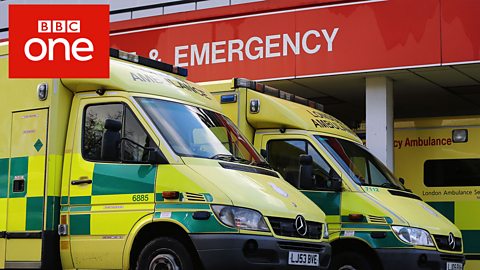Meet Becky and learn more about life as an urgent care desk paramedic, helping patients over the phone. Part of our Bitesize world of work series.
Becky
I'm Becky, I'm 32 and I'm a senior paramedic within the Clinical Hub. The Clinical Hub started up when we realised that a lot of the jobs we were going to were not always a life-threatening emergency. When a 999 call is made, our call handlers ask the patient a series of important questions. If an emergency ambulance is not required, then the call ends up within the Clinical Hub. You could be called back by a mental health practitioner, a nurse, a specialist paramedic or pharmacist. Essentially, it will be what is appropriate for your reason to call 999.
[Becky on the phone] "Hi, good afternoon. My name is Becky. I'm a paramedic calling from the ambulance service."
I become a private investigator for the day in order for me to create a picture, a holistic picture of why you've called and how we can appropriately help you.
[Becky on the phone] "The pain in your stomach at the moment – tell me more about that. Is it around your belly button? Above your belly button or below? So above and below? Okay."
It does come with its challenges. When you are an operational paramedic on the road, you have got the capability of being able to see a patient face-to-face. However, on the phone we have to use our ears.
[Becky on the phone] "Is it your friend that I can hear in the background? Ah awesome. Can you do me a favour? Can you just tell me what he looks like to you? How does he look? Pale? Okay. I do think he needs to be seen by a doctor today, given that obviously he's missed his meds and he might need some fluids. If he's been persistently vomiting for so long."
Our ambulances are few and far between, we do try and keep them and held them back to our most life-threatening emergencies, but ultimately that patient that day may not have even required an emergency ambulance and if one was sent and the emergency ambulance couldn’t actually help the patient, it would not be in their best interest, so we're here to provide a service of making sure the patient gets the appropriate care that day.
[Becky on the phone] "The hospital is just over half a mile from your address, but obviously we can explore different options getting you there. Do you think you're safe and well enough to get into a taxi and get to the hospital? Yeah. If anything changes whilst you are making your way to hospital, you must call us back immediately on 999 for further help and advice okay? Take care. Bye bye."
Dionne, Becky's colleague
Becky is very calm and very reassuring and very reassuring to her patients, but also she is a nice person to work with.
Becky
You have to work on the road as an operational paramedic before you come into an urgent care environment. My journey started atcollege. I did a BTEC National Diploma in Health Studies in order to get to university to study Paramedic Studies. Being on the road, I was able to help patients on a face-to-face basis. I'm now able to help them over the phone. It's a completely different job, but I stillget the same satisfaction.
Being on the road, I was able to help patients on a face-to-face basis. I'm now able to help them over the phone. It's a completely different job, but I still get the same satisfaction.
- Becky is a senior paramedic within the Clinical Hub. 999 calls that don't require an emergency ambulance are directed to the Clinical Hub. Specialists such as mental health nurses, pharmacists or paramedics like Becky then work out the best way to help the patient
- She compares her job to a private investigator. When you're a paramedic on the road, you can see a patient face-to-face but, on the phone, you need to ask the right questions to work out how to help them
- Her journey to being a senior paramedic in the Clinical Hub began in college on a BTEC in Health Studies course followed by Paramedic Studies at university and time on the road as a paramedic.

Before being able to become a specialist paramedic, you will need to be a qualified paramedic and have at least two years of experience on the road. For more information about the opportunities for experienced paramedics to develop into more senior roles, check out NHS Health Careers.
What to expect if you want to become a paramedic
Paramedic average salary: NHS band 5-6. Read more about NHS bands. Salaries will differ in private healthcare.
Paramedic typical working hours: 36 to 38 hours per week. You work shifts, which could include evenings, weekends and bank holidays.
What qualifications do you need to be a paramedic?
You can get into this role via a university course, an apprenticeship, working towards the role or applying for a trainee scheme.
Source: LMI for All, National Careers Service, NHS Health Careers
This information is a guide and is constantly changing. Please check the National Careers Service website and the NHS Health Careers website for more information about working as a paramedic for the latest information and all the qualifications needed.
For careers advice in all parts of the UK visit: National Careers Service (England), nidirect (Northern Ireland), My World of Work (Scotland) and Careers Wales (Wales).


Work experience in your area
Find work experience placements with Workfinder.
Tips and advice
Help with interviews, writing a CV and all things work experience related.


Khadija: first aider
Khadija uses her medical knowledge to teach young people first aid.

How to become a paramedic. collection
A collection of paramedic job profiles and information about what the role entails.

Sarah: critical care staff nurse
Sarah works as a staff nurse in a critical care unit in Cardiff.

